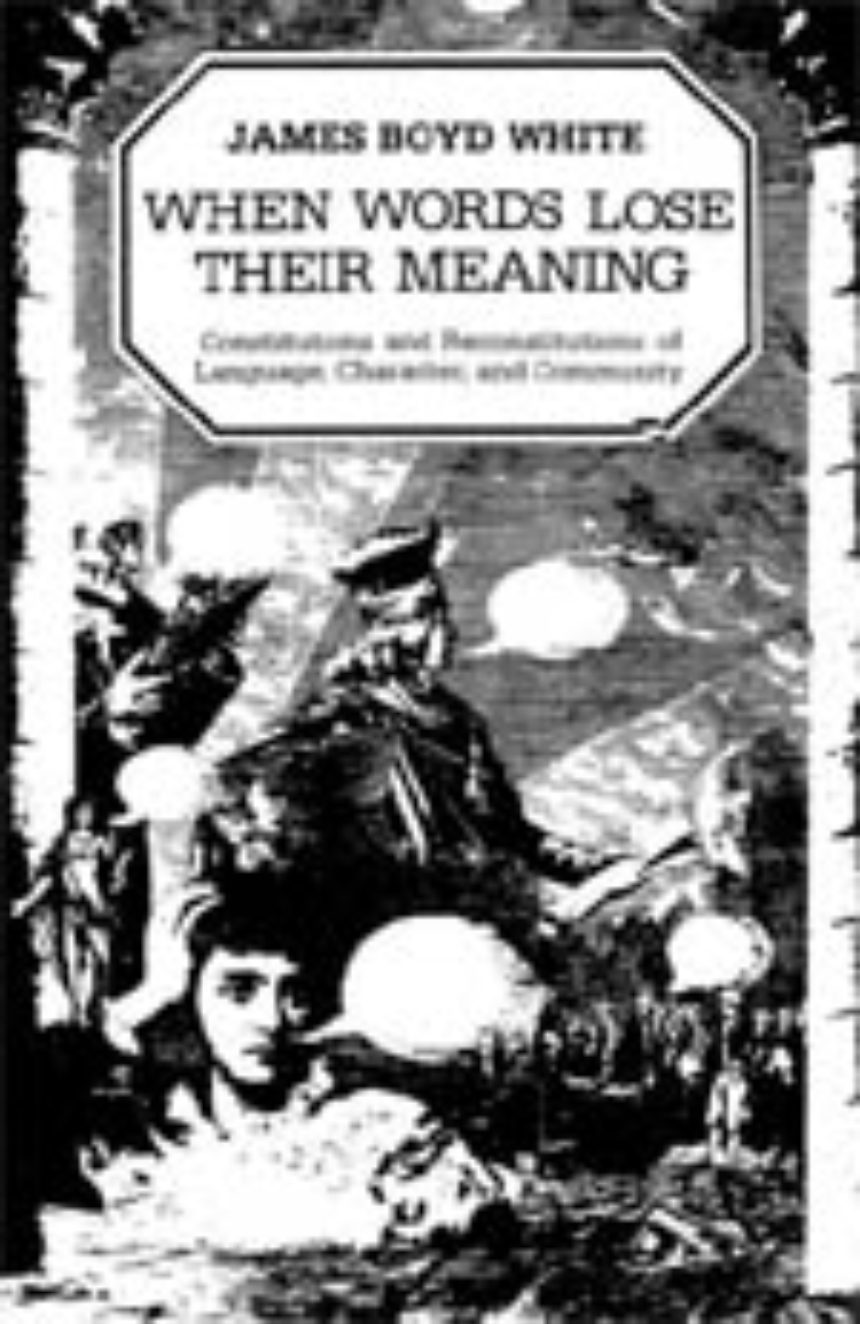When Words Lose Their Meaning
Constitutions and Reconstitutions of Language, Character, and Community
9780226895024
9780226056043
When Words Lose Their Meaning
Constitutions and Reconstitutions of Language, Character, and Community
Through fresh readings of texts ranging from Homer’s Iliad, Swift’s Tale of a Tub, and Austen’s Emma through the United States Constitution and McCulloch v. Maryland, James Boyd White examines the relationship between an individual mind and its language and culture as well as the "textual community" established between writer and audience. These striking textual analyses develop a rhetoric—a "way of reading" that can be brought to any text but that, in broader terms, becomes a way of learning that can shape the reader’s life.
"In this ambitious and demanding work of literary criticism, James Boyd White seeks to communicate ’a sense of reading in a new and different way.’ . . . [White’s] marriage of lawyerly acumen and classically trained literary sensibility—equally evident in his earlier work, The Legal Imagination—gives the best parts of When Words Lose Their Meaning a gravity and moral earnestness rare in the pages of contemporary literary criticism."—Roger Kimball, American Scholar
"James Boyd White makes a state-of-the-art attempt to enrich legal theory with the insights of modern literary theory. Of its kind, it is a singular and standout achievement. . . . [White’s] selections span the whole range of legal, literary, and political offerings, and his writing evidences a sustained and intimate experience with these texts. Writing with natural elegance, White manages to be insightful and inciteful. Throughout, his timely book is energized by an urgent love of literature and law and their liberating potential. His passion and sincerity are palpable."—Allan C. Hutchinson, Yale Law Journal
"Undeniably a unique and significant work. . . . When Words Lose Their Meaning is a rewarding book by a distinguished legal scholar. It is a showcase for the most interesting sort of inter-disciplinary work: the kind that brings together from traditionally separate fields not so much information as ideas and approaches."—R. B. Kershner, Jr., Georgia Review
"In this ambitious and demanding work of literary criticism, James Boyd White seeks to communicate ’a sense of reading in a new and different way.’ . . . [White’s] marriage of lawyerly acumen and classically trained literary sensibility—equally evident in his earlier work, The Legal Imagination—gives the best parts of When Words Lose Their Meaning a gravity and moral earnestness rare in the pages of contemporary literary criticism."—Roger Kimball, American Scholar
"James Boyd White makes a state-of-the-art attempt to enrich legal theory with the insights of modern literary theory. Of its kind, it is a singular and standout achievement. . . . [White’s] selections span the whole range of legal, literary, and political offerings, and his writing evidences a sustained and intimate experience with these texts. Writing with natural elegance, White manages to be insightful and inciteful. Throughout, his timely book is energized by an urgent love of literature and law and their liberating potential. His passion and sincerity are palpable."—Allan C. Hutchinson, Yale Law Journal
"Undeniably a unique and significant work. . . . When Words Lose Their Meaning is a rewarding book by a distinguished legal scholar. It is a showcase for the most interesting sort of inter-disciplinary work: the kind that brings together from traditionally separate fields not so much information as ideas and approaches."—R. B. Kershner, Jr., Georgia Review
394 pages | 6 x 9 | © 1984
Language and Linguistics: Language and Law
Law and Legal Studies: Legal Thought
Table of Contents
Preface
Acknowledgments
1. A Way of Reading
2. Poetry and the World of Two
Cultural Criticism and the Ideal of Friendship in the Iliad
3. The Dissolution of Meaning
Thucydides’ History of His World
4. The Reconstitution of Language and Self in a Community of Two
Plato’s Gorgias
5. Making the Reader Make His Language
Swift’s A Tale of a Tub
6. Teaching a Language of Morality
Johnson’s Rambler Essays
7. "Conversation, Rational and Playful"
The Language of Friendship in Jane Austen’s Emma
8. Making a Public World
The Constitution of Language and Community in Burke’s Reflections
9. Constituting a Culture of Argument
The Possibilities of American Law
10. An Afterword
Bibliographies and Notes
Index
Acknowledgments
1. A Way of Reading
2. Poetry and the World of Two
Cultural Criticism and the Ideal of Friendship in the Iliad
3. The Dissolution of Meaning
Thucydides’ History of His World
4. The Reconstitution of Language and Self in a Community of Two
Plato’s Gorgias
5. Making the Reader Make His Language
Swift’s A Tale of a Tub
6. Teaching a Language of Morality
Johnson’s Rambler Essays
7. "Conversation, Rational and Playful"
The Language of Friendship in Jane Austen’s Emma
8. Making a Public World
The Constitution of Language and Community in Burke’s Reflections
9. Constituting a Culture of Argument
The Possibilities of American Law
10. An Afterword
Bibliographies and Notes
Index
